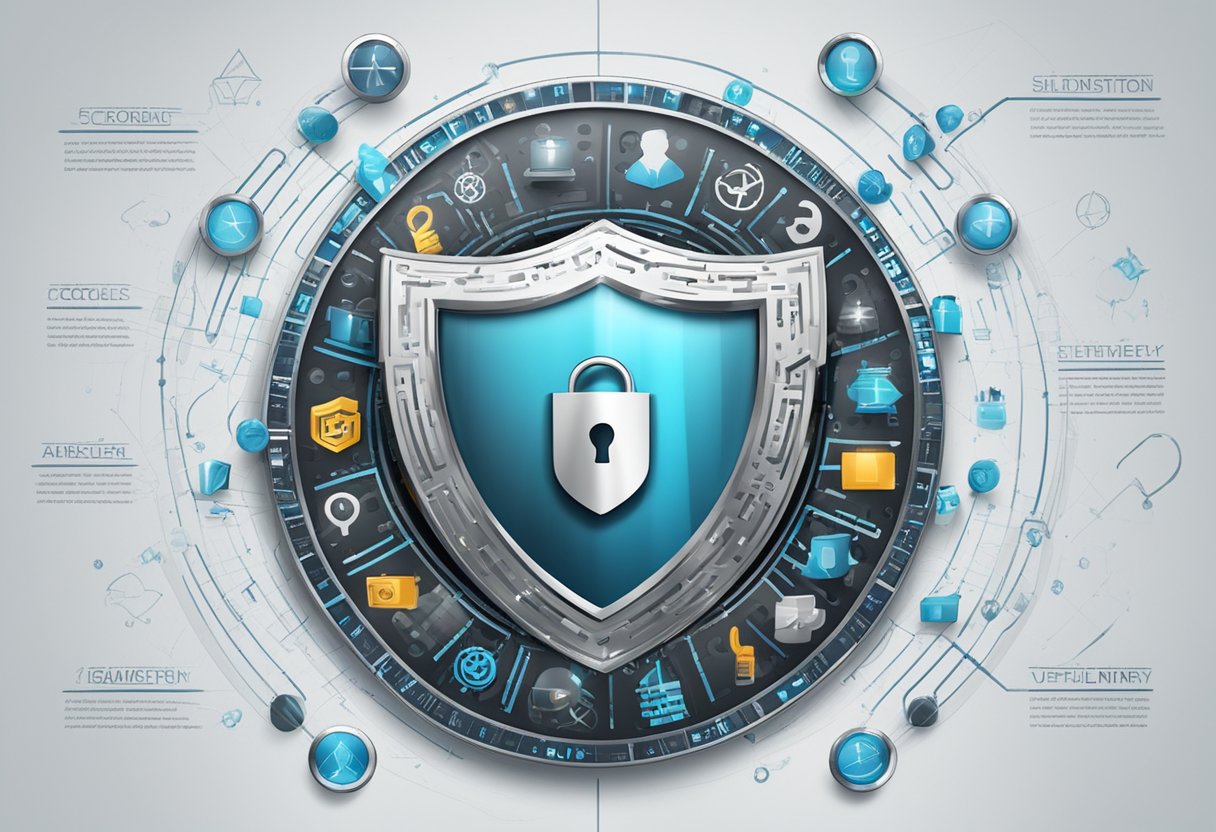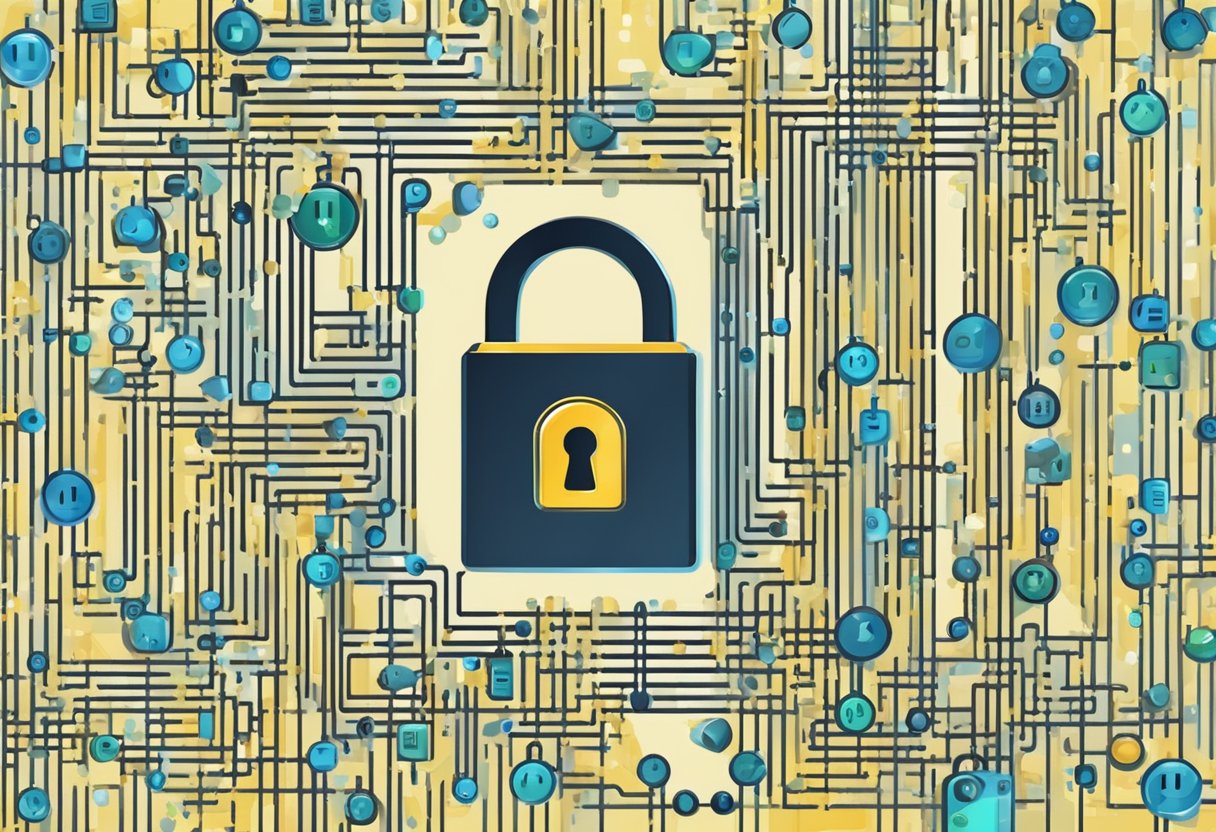Cybersecurity is a growing concern in today's world, with data breaches and cyber attacks becoming more frequent and sophisticated. It is more important than ever to stay informed and up to date on the latest cybersecurity trends and best practices. One way to do this is by listening to cybersecurity podcasts, which provide valuable insights and information from experts in the field.

There are a variety of cybersecurity podcasts available, covering topics such as hacking, data privacy, and cybercrime. Some podcasts are geared towards security professionals, while others are more accessible to the general public. The best podcasts for cyber security offer a mix of informative content and engaging storytelling, making them both educational and entertaining.
Whether you're a cybersecurity professional looking to stay up to date on the latest industry news, or simply someone interested in learning more about online security, there is a podcast out there for you. By listening to these podcasts, you can gain valuable insights and knowledge that can help you stay safe and secure in the digital age.
Understanding Cyber Security

Cybersecurity is the practice of protecting electronic devices, networks, and sensitive information from unauthorized access or theft. With the rise of technology and the increasing amount of data being stored online, cybersecurity has become a critical concern for individuals, businesses, and governments alike.
The field of cybersecurity encompasses a wide range of topics and best practices, including threat intelligence, network security, cloud security, device security, cryptography, encryption, 2FA, IoT, and SecOps. To effectively protect against security threats, it is essential to stay up-to-date on the latest technology trends and security protocols.
One of the most significant challenges in cybersecurity is the constantly evolving nature of security threats. Cybercriminals are always finding new ways to exploit vulnerabilities in systems and steal sensitive information. As a result, it is crucial to implement strong security measures and regularly update software and systems to protect against potential threats.
Another important aspect of cybersecurity is data privacy. With the increasing amount of data being collected and stored online, it is essential to ensure that sensitive information is protected from unauthorized access. This includes implementing encryption and access controls to prevent data breaches.
In summary, cybersecurity is a critical concern in today's digital age. By implementing best practices and staying up-to-date on the latest security protocols, individuals and organizations can effectively protect against security threats and safeguard sensitive information.
Top Cyber Security Podcasts
https://www.youtube.com/watch?v=7s8Cpj6Xi20&embed=true
Podcasts are a great way to stay up-to-date on the latest news and trends in the world of cyber security. Here are some of the top cyber security podcasts that you should check out:
CyberWire Daily
The CyberWire Daily podcast is a 20-minute roundup of the day's top cyber security news stories. Hosted by Dave Bittner, this podcast is a great way to stay informed about the latest threats and vulnerabilities.
Darknet Diaries
If you're looking for a podcast that tells real-life stories of hackers and cyber criminals, then Darknet Diaries is the podcast for you. Hosted by Jack Rhysider, this podcast takes a deep dive into some of the most fascinating and complex cyber crimes of our time.
Security Now
Security Now is a weekly podcast hosted by Steve Gibson and Leo Laporte. The podcast covers a wide range of topics related to cyber security, including the latest threats, vulnerabilities, and best practices for staying safe online.
Smashing Security
Smashing Security is a weekly podcast hosted by Graham Cluley and Carole Theriault. The podcast covers a wide range of topics related to cyber security, including the latest threats, vulnerabilities, and best practices for staying safe online.
Hacking Humans
Hacking Humans is a podcast produced by the CyberWire. Hosted by Dave Bittner and Joe Carrigan, this podcast explores the social engineering tactics used by cyber criminals to trick people into giving up their personal information.
Risky Business
Risky Business is a weekly podcast hosted by Patrick Gray. The podcast covers a wide range of topics related to cyber security, including the latest threats, vulnerabilities, and best practices for staying safe online.
Malicious Life
Malicious Life is a podcast that tells the stories of some of the most notorious cyber attacks in history. Hosted by Ran Levi, this podcast takes a deep dive into the people and organizations behind these attacks.
Unsupervised Learning
Unsupervised Learning is a weekly podcast hosted by Daniel Miessler. The podcast covers a wide range of topics related to cyber security, including the latest threats, vulnerabilities, and best practices for staying safe online.
OSINT Show
The OSINT Show is a podcast that focuses on open source intelligence (OSINT) and digital investigations. Hosted by Michael Bazzell, this podcast covers a wide range of topics related to OSINT, including tools, techniques, and best practices.
CISO Series
The CISO Series is a podcast that focuses on issues related to chief information security officers (CISOs). Hosted by David Spark, this podcast covers a wide range of topics related to cyber security leadership, including strategy, risk management, and incident response.
ISC StormCast
The ISC StormCast is a daily podcast that provides a quick overview of the latest cyber security news and trends. Hosted by Johannes Ullrich, this podcast is a great way to stay informed about the latest threats and vulnerabilities.
Getting Into Infosec
Getting Into Infosec is a podcast that focuses on helping people start a career in cyber security. Hosted by Ayman Elsawah, this podcast provides practical advice and guidance for people who are interested in entering the field.
The Cyber Queens Podcast
The Cyber Queens Podcast is a podcast that focuses on women in cyber security. Hosted by Amanda Berlin, this podcast features interviews with women who are making a difference in the field.
Privacy, Security, & OSINT Show
The Privacy, Security, & OSINT Show is a podcast that focuses on privacy, security, and open source intelligence (OSINT). Hosted by Michael Bazzell, this podcast covers a wide range of topics related to these areas, including tools, techniques, and best practices.
Recognized Podcast Hosts

When it comes to cybersecurity podcasts, there are a few recognized podcast hosts who have made a name for themselves in the industry. These hosts have years of experience and are known for their expertise and knowledge in the field. Here are some of the most recognized podcast hosts in the cybersecurity industry:
Graham Cluley: Graham Cluley is a well-known cybersecurity expert and the host of the "Smashing Security" podcast. He has been in the industry for over 25 years and has worked with some of the biggest companies in the world. His podcast covers a wide range of cybersecurity topics and is known for its informative and entertaining content.
Carole Theriault: Carole Theriault is another recognized cybersecurity expert and the co-host of the "Smashing Security" podcast. She has over 20 years of experience in the industry and is known for her expertise in social engineering and phishing attacks. Her podcast covers a range of cybersecurity topics and is known for its engaging and informative content.
Daniel Miessler: Daniel Miessler is a cybersecurity expert and the host of the "Unsupervised Learning" podcast. He has over 20 years of experience in the industry and is known for his expertise in threat intelligence and vulnerability management. His podcast covers a wide range of cybersecurity topics and is known for its in-depth analysis and insights.
Patrick Gray: Patrick Gray is a cybersecurity expert and the host of the "Risky Business" podcast. He has over 15 years of experience in the industry and is known for his expertise in cybercrime and cyber espionage. His podcast covers a range of cybersecurity topics and is known for its insightful and thought-provoking content.
Dave Bittner: Dave Bittner is a cybersecurity expert and the host of the "CyberWire Daily" podcast. He has over 20 years of experience in the industry and is known for his expertise in cyber threats and cyber attacks. His podcast covers the latest cybersecurity news and is known for its informative and concise content.
Joe Carrigan: Joe Carrigan is a cybersecurity expert and the co-host of the "Hacking Humans" podcast. He has over 20 years of experience in the industry and is known for his expertise in social engineering and phishing attacks. His podcast covers a range of cybersecurity topics and is known for its engaging and informative content.
Tom Eston: Tom Eston is a cybersecurity expert and the host of the "Shared Security" podcast. He has over 15 years of experience in the industry and is known for his expertise in data privacy and security. His podcast covers a range of cybersecurity topics and is known for its practical and actionable advice.
Scott Wright: Scott Wright is a cybersecurity expert and the host of the "Security Insights" podcast. He has over 20 years of experience in the industry and is known for his expertise in threat intelligence and vulnerability management. His podcast covers a range of cybersecurity topics and is known for its informative and engaging content.
Rafal Los: Rafal Los is a cybersecurity expert and the host of the "Down the Security Rabbithole" podcast. He has over 20 years of experience in the industry and is known for his expertise in risk management and compliance. His podcast covers a range of cybersecurity topics and is known for its insightful and thought-provoking content.
James Jardine: James Jardine is a cybersecurity expert and the host of the "Application Security Weekly" podcast. He has over 15 years of experience in the industry and is known for his expertise in application security and secure coding practices. His podcast covers a range of cybersecurity topics and is known for its practical and actionable advice.
These recognized podcast hosts have made significant contributions to the cybersecurity industry and continue to provide valuable insights and information to their listeners.
Significant Cyber Security Topics
https://www.youtube.com/watch?v=MqLFhOTMZK8&embed=true
Cybersecurity is a constantly evolving field that requires keeping up-to-date with the latest trends and threats. Some of the most significant cybersecurity topics include:
Breaches
Breaches are a significant cybersecurity concern as they can result in the loss of sensitive information such as personal data, financial information, and trade secrets. Companies should take steps to prevent breaches by implementing security measures such as firewalls, intrusion detection systems, and encryption.
Hacking
Hacking is a common cybersecurity threat that can result in the theft of sensitive information or the disruption of computer systems. Hackers can gain access to computer systems through vulnerabilities in software or social engineering tactics. Organizations should implement security measures such as strong passwords, two-factor authentication, and regular software updates to prevent hacking.
Cybercrime
Cybercrime encompasses a broad range of criminal activities that are conducted online. These can include identity theft, fraud, and the distribution of malware. Organizations should implement security measures such as antivirus software, firewalls, and intrusion detection systems to prevent cybercrime.
Data Breaches
Data breaches occur when sensitive information is accessed or stolen without authorization. These can result in significant financial losses and damage to an organization's reputation. Companies should implement security measures such as encryption, access controls, and regular security audits to prevent data breaches.
Ransomware
Ransomware is a type of malware that encrypts a victim's files and demands payment in exchange for the decryption key. Ransomware attacks can be devastating for businesses as they can result in the loss of important data and significant financial losses. Organizations should implement security measures such as regular backups, antivirus software, and employee training to prevent ransomware attacks.
Cyber Attacks
Cyber attacks can take many forms, including denial-of-service attacks, malware attacks, and phishing attacks. These attacks can result in the disruption of computer systems, the theft of sensitive information, and financial losses. Companies should implement security measures such as firewalls, intrusion detection systems, and employee training to prevent cyber attacks.
Spyware
Spyware is a type of malware that is designed to gather information from a victim's computer without their knowledge or consent. Spyware can be used for a variety of purposes, including identity theft and corporate espionage. Organizations should implement security measures such as antivirus software and regular security audits to prevent spyware attacks.
Phishing Schemes
Phishing schemes are a type of social engineering attack that is designed to trick victims into divulging sensitive information such as login credentials or financial information. Phishing schemes can be conducted through email, social media, or other communication channels. Companies should implement employee training programs and security measures such as spam filters to prevent phishing attacks.
Social Engineering Scams
Social engineering scams are a type of cyber attack that is designed to exploit human psychology to gain access to sensitive information or computer systems. These attacks can take many forms, including pretexting, baiting, and quid pro quo. Organizations should implement employee training programs and security measures such as access controls to prevent social engineering scams.
Role of Humor and True Stories in Podcasts
https://www.youtube.com/watch?v=RHU0aTYV8i4&embed=true
Humor and true stories play a significant role in making cybersecurity podcasts more engaging and relatable to listeners. Humor can help lighten the mood and make the discussion of complex cybersecurity topics more approachable and digestible. Incorporating true stories can also help listeners understand the real-world impact of cybersecurity threats and the importance of taking security measures seriously.
Many cybersecurity podcasts use humor to tackle imposter syndrome, a common feeling among cybersecurity professionals who may doubt their abilities or feel like they don't belong in the industry. By using humor to address imposter syndrome, cybersecurity podcasts can help listeners feel more confident in their skills and more connected to the community.
True stories are also a powerful tool in cybersecurity podcasts. They can illustrate the real-world consequences of cybersecurity incidents and help listeners understand the importance of taking security measures seriously. By sharing stories of successful attacks and the lessons learned from them, cybersecurity podcasts can help listeners better understand the risks and take proactive steps to protect themselves and their organizations.
One popular cybersecurity podcast that incorporates both humor and true stories is Darknet Diaries. The host, Jack Rhysider, uses humor to make complex topics more approachable and shares true stories of cybercrime to illustrate the real-world impact of cybersecurity threats. Darknet Diaries has gained a large following due to its engaging storytelling and relatable approach to cybersecurity.
Overall, incorporating humor and true stories into cybersecurity podcasts can help make the industry more accessible and engaging to a wider audience. By addressing imposter syndrome and sharing real-world stories of cybercrime, cybersecurity podcasts can help listeners better understand the importance of cybersecurity and take proactive steps to protect themselves and their organizations.
Understanding Cyber Criminals
https://www.youtube.com/watch?v=axW8klRPNq8&embed=true
Cybercriminals are individuals or groups who use technology to commit crimes. They can be hackers, insiders, or outsiders who use various techniques to exploit vulnerabilities in computer systems and networks. Understanding how cybercriminals operate can help individuals and organizations protect themselves from cyber threats.
Motivations of Cyber Criminals
Cybercriminals are often motivated by financial gain. They may steal sensitive information, such as credit card numbers or personal data, and sell it on the dark web. They may also engage in ransomware attacks, where they encrypt a victim's data and demand payment in exchange for the decryption key. In some cases, cybercriminals may be motivated by political or ideological reasons, such as hacktivism or cyber espionage.
Methods Used by Cyber Criminals
Cybercriminals use a variety of methods to exploit vulnerabilities in computer systems and networks. They may use social engineering techniques to trick individuals into revealing sensitive information, such as passwords or credit card numbers. They may also use malware, such as viruses or Trojans, to gain access to a victim's computer system or network. In addition, cybercriminals may use phishing attacks, where they send fraudulent emails or messages that appear to be from a trusted source, to trick individuals into revealing sensitive information or downloading malware.
Criminal Exploits
Cybercriminals often exploit vulnerabilities in computer systems and networks to gain unauthorized access. They may use software vulnerabilities, such as unpatched software or weak passwords, to gain access to a victim's computer system or network. They may also exploit human vulnerabilities, such as social engineering or phishing, to trick individuals into revealing sensitive information.
Conclusion
Understanding how cybercriminals operate is crucial for protecting against cyber threats. By knowing their motivations and methods, individuals and organizations can take steps to protect themselves from cyber attacks. This includes implementing strong passwords, keeping software up to date, and being vigilant against social engineering and phishing attacks.
Importance of Staying Updated
https://www.youtube.com/watch?v=Ca_0cRg1dKg&embed=true
Staying up-to-date with the latest cyber security trends and news is critical for anyone who wants to protect their online presence. Cyber threats are constantly evolving, and new vulnerabilities are discovered every day. Without the right information, it's easy to fall behind and leave yourself vulnerable to attack.
Cyber security professionals need to stay informed about the latest threats and trends to be effective in their roles. By staying up-to-date, they can identify and respond to new threats quickly, develop effective security strategies, and make informed decisions about how to protect their organizations.
For individuals, staying informed about the latest cyber security news and trends is also essential. It can help them protect their personal information, avoid scams and phishing attacks, and stay safe online. With the rise of remote work and online activity, cyber security has become more important than ever before.
There are many ways to stay informed about the latest cyber security news and trends. One of the best ways is to listen to cyber security podcasts. Podcasts are a convenient way to stay up-to-date while on the go, and they often feature expert guests who can provide valuable insights and analysis.
Some of the best cyber security podcasts include the SANS Institute's "The 17 Best Cybersecurity Podcasts," Splunk's "The 9 Best Cybersecurity Podcasts To Listen To in 2023," and CyberNews' "8 Best Cybersecurity Podcasts For 2021." These podcasts cover a wide range of topics, from the latest cyber threats to emerging trends in cyber security.
In conclusion, staying informed about the latest cyber security news and trends is essential for anyone who wants to protect themselves online. Cyber security professionals, in particular, need to stay up-to-date to be effective in their roles. Cyber security podcasts are a great way to stay informed while on the go, and there are many excellent podcasts available that cover a wide range of topics.
Role of Industry and Security Experts

In the world of cybersecurity, industry and security experts play a crucial role in shaping the landscape of online security. These experts bring years of experience and knowledge to the table, helping to identify and mitigate potential security threats before they become major issues.
Industry experts are individuals who have worked in the cybersecurity field for a significant amount of time. They understand the ins and outs of the industry and have a deep understanding of the latest threats and trends. These experts often work for large corporations or government agencies, where they are responsible for protecting sensitive information and preventing cyber attacks.
Security experts, on the other hand, are individuals who specialize in cybersecurity. They are responsible for identifying potential vulnerabilities in computer systems, networks, and applications. They work to develop and implement security protocols that can help prevent cyber attacks and protect sensitive information.
Security researchers are another important group of experts in the cybersecurity field. These individuals work to identify and analyze new threats and vulnerabilities. They often work independently or for security firms, where they are responsible for discovering new security flaws and developing patches to fix them.
Overall, industry and security experts play a critical role in keeping our online world safe and secure. Through their expertise and knowledge, they help to identify potential threats and develop effective solutions to prevent cyber attacks. As the threat landscape continues to evolve, these experts will continue to play a crucial role in protecting our digital infrastructure.
The Relevance of Online and Data Privacy
https://www.youtube.com/watch?v=2iPDpV8ojHA&embed=true
In today's digital age, data privacy is more important than ever. With the increasing number of data breaches and cyber attacks, it has become essential to take measures to protect one's online privacy. Online privacy refers to the ability to control what information is shared online and who has access to it. Data privacy, on the other hand, refers to the protection of personal and sensitive information from unauthorized access, use, or disclosure.
One of the best ways to protect online and data privacy is by using password managers. Password managers are software applications that help users generate and store strong and unique passwords for each of their online accounts. LastPass is one of the most popular password managers available today. It not only helps users generate and store passwords but also provides additional security features such as two-factor authentication and password sharing.
It is also important to be aware of the privacy policies of websites and applications that one uses. Many websites and applications collect user data for various purposes such as targeted advertising. It is essential to read the privacy policies carefully and understand how the data is being collected and used.
In addition, users can take measures such as using virtual private networks (VPNs) and browser extensions that block tracking scripts to enhance their online privacy. VPNs encrypt internet traffic and hide the user's IP address, making it difficult for third parties to track their online activities. Browser extensions such as uBlock Origin and Privacy Badger block tracking scripts and prevent websites from collecting user data without their consent.
In conclusion, online and data privacy are crucial in today's digital age. By using password managers, being aware of privacy policies, and taking measures such as using VPNs and browser extensions, users can protect their online privacy and keep their personal and sensitive information safe from unauthorized access.
Understanding Social Engineering
https://www.youtube.com/watch?v=9U-JgdUkaTQ&embed=true
Social engineering is a technique that cybercriminals use to manipulate people into divulging sensitive information or performing actions that are detrimental to their own security. It is a psychological attack that exploits human behavior rather than technical vulnerabilities.
Social engineering attacks can take many forms, such as phishing, pretexting, baiting, quid pro quo, and tailgating. These attacks are often successful because they prey on human emotions like fear, curiosity, greed, and trust.
Phishing is the most common form of social engineering attack. It involves sending an email that appears to be from a legitimate source, such as a bank or a social media site, to trick the recipient into clicking on a link or opening an attachment that contains malware or a fake login page. Pretexting involves creating a false scenario to gain the victim's trust and extract information. Baiting involves leaving a physical device, such as a USB drive, in a public place to entice someone to pick it up and plug it into their computer. Quid pro quo involves offering a benefit in exchange for information or access. Tailgating involves following someone into a restricted area without proper authorization.
To protect against social engineering attacks, individuals and organizations should take the following steps:
- Be wary of unsolicited emails, phone calls, or text messages asking for personal or sensitive information.
- Verify the identity of the sender or caller before providing any information or taking any action.
- Use strong and unique passwords for all accounts and enable two-factor authentication when possible.
- Keep software and security systems up to date to prevent exploitation of known vulnerabilities.
- Train employees to recognize and report social engineering attacks.
- Have a response plan in place in case of a successful attack.
By understanding social engineering tactics and taking proactive measures to prevent them, individuals and organizations can better protect themselves against cyber threats.
The Use of Open Source Intelligence
https://www.youtube.com/watch?v=g5UHijJ_Jo0&embed=true
Open Source Intelligence (OSINT) is the practice of collecting and analyzing publicly available information to gain insights and intelligence. OSINT has become an essential tool for cybersecurity professionals, as it provides a wealth of information that can be used to identify potential threats, vulnerabilities, and attack vectors.
One of the main advantages of OSINT is that it provides a comprehensive view of the threat landscape. By monitoring social media, forums, and other online platforms, cybersecurity professionals can gain insights into the tactics, techniques, and procedures used by threat actors. This information can be used to develop more effective defenses and to identify potential weaknesses in existing security measures.
Another advantage of OSINT is that it is often free or low-cost. Many OSINT tools and resources are available online, and they can be used by anyone with an internet connection. This makes OSINT an accessible and cost-effective way to gather intelligence and stay up-to-date on the latest threats and trends.
However, there are also some limitations to OSINT. For example, the information gathered through OSINT may not always be accurate or reliable. It is important to verify the information obtained through OSINT using other sources before taking any action based on that information.
Overall, OSINT is a valuable tool for cybersecurity professionals, and it is likely to become even more important in the future as the volume of publicly available information continues to grow. By using OSINT effectively, cybersecurity professionals can gain a more comprehensive understanding of the threat landscape and develop more effective defenses against cyber threats.
Sources:
The Impact of Cyber Security on Different Sectors

Cybersecurity is an ever-growing concern for organizations of all sizes and sectors, as cyber threats continue to evolve and become more sophisticated. In this section, we will explore the impact of cybersecurity on different sectors, including networks, academia, healthcare, education, mobile devices, and point-of-sale (POS) threats.
Networks
Networks are the backbone of modern business operations, and their security is critical to ensure the confidentiality, integrity, and availability of data. Cyberattacks on networks can result in data breaches, financial losses, and reputational damage. To mitigate these risks, organizations must implement robust cybersecurity measures, such as firewalls, intrusion detection and prevention systems, and regular vulnerability assessments.
Academia
Academic institutions hold a vast amount of sensitive data, including student records, research data, and intellectual property. Cyberattacks on academic institutions can result in data breaches, intellectual property theft, and reputational damage. To protect against cyber threats, academic institutions must implement strong cybersecurity policies, train their staff and students on cybersecurity best practices, and conduct regular security assessments.
Healthcare
The healthcare sector is a prime target for cybercriminals due to the sensitive nature of the data it holds. Cyberattacks on healthcare organizations can result in data breaches, patient harm, and financial losses. To protect against cyber threats, healthcare organizations must implement robust cybersecurity measures, such as access controls, data encryption, and regular security assessments.
Education
The education sector is also a prime target for cybercriminals due to the large amount of sensitive data it holds, including student records, financial data, and research data. Cyberattacks on educational institutions can result in data breaches, financial losses, and reputational damage. To protect against cyber threats, educational institutions must implement strong cybersecurity policies, train their staff and students on cybersecurity best practices, and conduct regular security assessments.
Mobile Devices
Mobile devices are ubiquitous in modern society, and their security is critical to protect against cyber threats. Cyberattacks on mobile devices can result in data breaches, financial losses, and reputational damage. To protect against cyber threats, individuals and organizations must implement strong passwords, use two-factor authentication, and regularly update their mobile devices' software and security settings.
Point-of-Sale (POS) Threats
Point-of-sale (POS) systems are a prime target for cybercriminals due to the sensitive financial data they hold. Cyberattacks on POS systems can result in data breaches, financial losses, and reputational damage. To protect against POS threats, organizations must implement strong cybersecurity measures, such as encryption, access controls, and regular security assessments.
In conclusion, cybersecurity is a critical concern for organizations of all sizes and sectors, and the impact of cyber threats can be severe. To mitigate these risks, organizations must implement robust cybersecurity measures, train their staff on cybersecurity best practices, and conduct regular security assessments.
The Art of Podcasting

Podcasting has become an increasingly popular medium for delivering content to audiences around the world. The rise of podcasting has been fueled by the ease of access to content, the ability to consume content on-the-go, and the wide range of topics that are covered by podcasts. In the world of cybersecurity, podcasting has become a valuable tool for professionals and enthusiasts alike to stay informed and up-to-date on the latest trends and developments in the field.
The art of podcasting involves creating engaging and informative content that is delivered in an easy-to-digest format. A successful podcast requires a solid content blueprint, a clear and concise delivery, and a commitment to consistency. The blueprint for a podcast should be carefully considered, taking into account the target audience, the topics that will be covered, and the format of the show. Some podcasts are interview-based, while others are more conversational in nature. The format of the show should be chosen based on the content and the target audience.
Content is king when it comes to podcasting. The content of a podcast should be engaging, informative, and relevant to the target audience. The content should be well-researched and presented in a clear and concise manner. The delivery of the content is also important. The host should be knowledgeable and confident, and the delivery should be clear and easy to understand.
Consistency is key when it comes to podcasting. The podcast should be released on a regular schedule, whether it is weekly, bi-weekly, or monthly. The audience should know when to expect new episodes, and the host should be committed to delivering new content on a consistent basis.
In conclusion, podcasting has become an important tool in the world of cybersecurity. The art of podcasting involves creating engaging and informative content that is delivered in a clear and concise manner. A successful podcast requires a solid content blueprint, a commitment to consistency, and a clear and confident delivery.
Conclusion

In conclusion, there are many great cybersecurity podcasts available for those interested in learning more about this important topic. From true crime stories to expert interviews, these podcasts offer a wealth of information and insights into the world of cybersecurity.
Listeners should consider their own interests and goals when selecting a podcast to follow. Some may prefer a more technical focus, while others may be more interested in the human stories behind cybercrime. It is also worth considering the frequency of new episodes and the length of each episode when choosing a podcast to follow.
Regardless of which podcast listeners choose, they can be confident that they are gaining valuable knowledge and insights into the world of cybersecurity. By staying informed and aware of the latest threats and trends, individuals can better protect themselves and their organizations from cyber attacks.
Overall, the cybersecurity podcasts listed in this article are just a few of the many great options available. By exploring different podcasts and finding the ones that best suit their needs, listeners can stay up-to-date on the latest developments in this important field.
Frequently Asked Questions

What are some highly recommended podcasts for staying up-to-date on cyber security?
For those looking to stay current on the latest cyber security trends and news, some highly recommended podcasts include "Security Now," "The CyberWire Daily," and "Darknet Diaries." These podcasts cover a wide range of topics, from data breaches and hacking incidents to emerging threats and security innovations.
Which podcasts offer beginner-friendly insights into cyber security?
For those new to the world of cyber security, podcasts like "The Social-Engineer Podcast" and "The Cybersecurity Podcast" are great starting points. These podcasts provide accessible insights into the basics of cyber security, including how to stay safe online and how to protect your personal data.
What are some of the most popular cyber security podcasts on Spotify?
Some of the most popular cyber security podcasts on Spotify include "Security Now," "The CyberWire Daily," and "The Cybersecurity Podcast." These podcasts have large followings and are updated regularly with new episodes.
Can you recommend any cyber security podcasts with a focus on industry news and trends?
For those interested in the latest news and trends in the cyber security industry, podcasts like "The Cybersecurity Brief" and "The Cybersecurity Ventures Podcast" are great options. These podcasts feature interviews with industry experts and cover topics like emerging threats, security innovations, and industry trends.
What are some lesser-known but highly informative cyber security podcasts?
For those looking for lesser-known but highly informative cyber security podcasts, "The Privacy, Security, & OSINT Show" and "Risky Business" are great options. These podcasts cover a wide range of topics, from privacy and security best practices to emerging threats and vulnerabilities.
Are there any podcasts that offer a more technical deep-dive into cyber security topics?
For those looking for a more technical deep-dive into cyber security topics, podcasts like "Security Now" and "The CyberWire Daily" are great options. These podcasts cover technical topics like encryption, network security, and vulnerability management in-depth, and are geared towards more experienced cyber security professionals.
